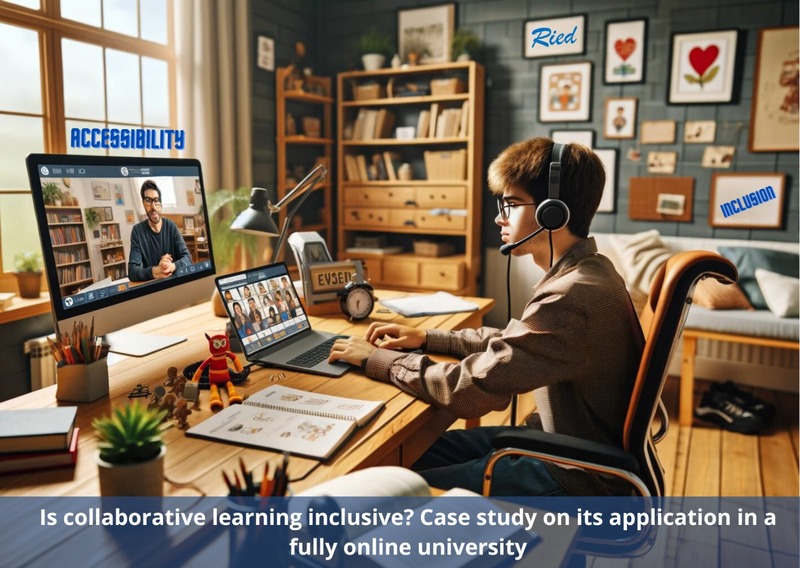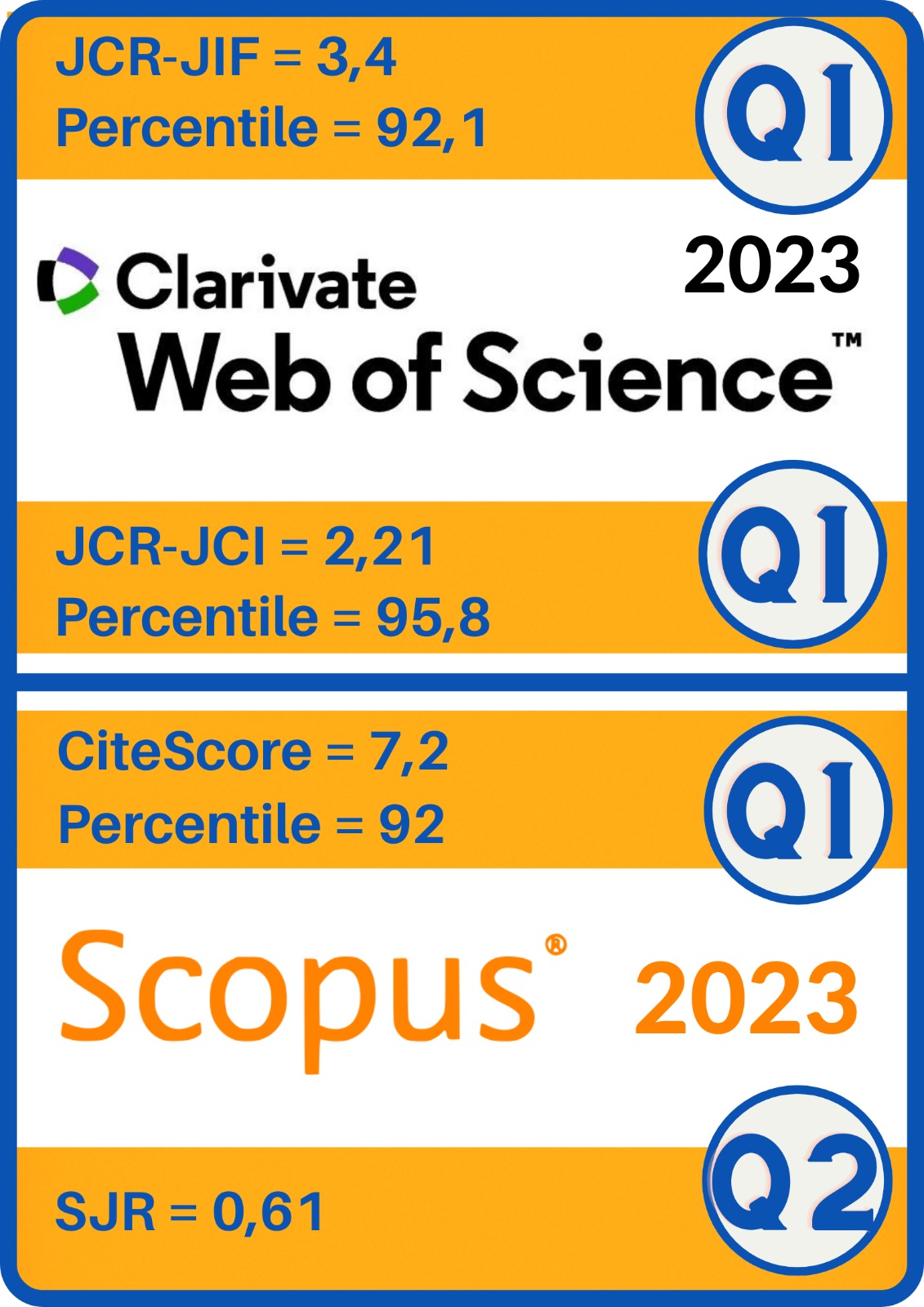¿Es inclusivo el aprendizaje colaborativo? Estudio de caso sobre su implementación en una universidad en línea
DOI:
https://doi.org/10.5944/ried.27.2.39072Palavras-chave:
educación a distancia, estudios universitarios, trabajo en equipo, interacción, igualdad de oportunidadesResumo
El aprendizaje colaborativo en línea ofrece numerosas ventajas para el desarrollo de las competencias del estudiantado, abarcando aspectos cognitivos, metacognitivos y afectivos. No obstante, su aplicación en la práctica docente enfrenta algunos desafíos, especialmente respecto a la participación de los estudiantes con discapacidad. El profesorado desempeña un papel fundamental para promover la participación equitativa de todo el estudiantado. Esta investigación se basa en un estudio de caso centrado en explorar las perspectivas de 12 profesores de una universidad en línea con experiencia en el acompañamiento de estudiantes con discapacidad en actividades colaborativas. Realizamos entrevistas semiestructuradas, analizadas a través del análisis temático. Según nuestros participantes, existen limitaciones respecto a la accesibilidad, flexibilidad, así como referente a aspectos socioemocionales que dificultan la plena participación de algunos estudiantes en el aprendizaje colaborativo. Su rol de mediadores permite que los estudiantes con discapacidad a menudo se involucren en los espacios de interacción, los debates y el trabajo en equipos. El aprendizaje colaborativo requiere el fortalecimiento de las competencias afectivas entre todos los involucrados, así como la flexibilización de las dinámicas de colaboración y la diversificación de los medios de trabajo para favorecer la participación de todo el estudiantado. Lograr esto representa un dilema para el profesorado, quienes deben buscar un balance entre la accesibilidad de las prácticas y el fomento de las relaciones afectivas. Consecuentemente, es necesario un esfuerzo institucional para convertir en inclusivas las activades colaborativas y que el profesorado tenga acceso a los conocimientos, información y recursos adecuados para un enfoque inclusivo.
Downloads
Referências
Badia, A., Becerril, L., & Romero, M. (2010). La construcción colaborativa de conocimiento en las redes de comunicación asíncrona y escrita (RCAE): Una revisión de los instrumentos analíticos. Culture and Education, 22(4), 455-474. https://doi.org/10.1174/113564010793351821
Badia, A., Garcia, C., & Meneses, J. (2017). Approaches to teaching online: Exploring factors influencing teachers in a fully online university. British Journal of Educational Technology, 48(6), 1193-1207. https://doi.org/10.1111/bjet.12475
Braun, V., & Clarke, V. (2006). Using thematic analysis in psychology. Qualitative Research in Psychology, 3(2), 77-101. https://doi.org/10.1191/1478088706qp063oa
Braun, V., Clarke, V., & Rance, N. (2015). How to use thematic analysis with interview data. In A. Vossler & N. Moller (Eds.), The Counselling and Psychotherapy Research Handbook (pp. 183-197). SAGE Publications. https://doi.org/10.4135/9781473909847.n13
Capdeferro, N., & Romero, M. (2012). Are online learners frustrated with collaborative learning experiences? The International Review of Research in Open and Distributed Learning, 13(2), 26-44. https://doi.org/10.19173/irrodl.v13i2.1127
Castellanos Ramírez, J. C., & Niño Carrasco, S. A. (2020). Aprendizaje colaborativo en línea, una aproximación empírica al discurso socioemocional de los estudiantes. Revista electrónica de investigación educativa, 22(e20), 1-12. https://doi.org/10.24320/redie.2020.22.e20.2329
Chen, W., Tan, J. S. H., & Pi, Z. (2021). The spiral model of collaborative knowledge improvement: An exploratory study of a networked collaborative classroom. International Journal of Computer-Supported Collaborative Learning, 16(1), 7-35. https://doi.org/10.1007/s11412-021-09338-6
Cress, U., Stahl, G., Ludvigsen, S., & Law, N. (2015). The core features of CSCL: Social situation, collaborative knowledge processes and their design. International Journal of Computer-Supported Collaborative Learning, 10(2), 109-116. https://doi.org/10.1007/s11412-015-9214-2
Dahlstrom-Hakki, I., Alstad, Z., & Banerjee, M. (2020). Comparing synchronous and asynchronous online discussions for students with disabilities: The impact of social presence. Computers & Education, 150, 103842. https://doi.org/10.1016/j.compedu.2020.103842
Fichten, C., Olenik-Shemesh, D., Asuncion, J., Jorgensen, M., & Colwell, C. (2020). Higher education, information and communication technologies and students with disabilities: An overview of the current situation. In J. Seale (Ed.), Improving Accessible Digital Practices in Higher Education: Challenges and New Practices for Inclusion (pp. 21-44). Springer International Publishing. https://doi.org/10.1007/978-3-030-37125-8_2
Gehret, A. U., Elliot, L. B., & MacDonald, J. H. C. (2017). Active collaborative learning through remote tutoring: A case study with students who are deaf or hard of hearing. Journal of Special Education Technology, 32(1), 36-46. https://doi.org/10.1177/0162643416681162
Hernández-Sellés, N., Muñoz-Carril, P.-C., & González-Sanmamed, M. (2023). Roles del docente universitario en procesos de aprendizaje colaborativo en entornos virtuales. RIED-Revista Iberoamericana de Educación a Distancia, 26(1), Article 1. https://doi.org/10.5944/ried.26.1.34031
Järvelä, S., Kirschner, P. A., Hadwin, A., Järvenoja, H., Malmberg, J., Miller, M., & Laru, J. (2016). Socially shared regulation of learning in CSCL: Understanding and prompting individual- and group-level shared regulatory activities. International Journal of Computer-Supported Collaborative Learning, 11(3), 263-280. https://doi.org/10.1007/s11412-016-9238-2
Jeong, H., Hmelo-Silver, C. E., & Jo, K. (2019). Ten years of Computer-Supported Collaborative Learning: A meta-analysis of CSCL in STEM education during 2005-2014. Educational Research Review, 28, 100284. https://doi.org/10.1016/j.edurev.2019.100284
Kalir, J. H. (2018). Equity-oriented design in open education. The International Journal of Information and Learning Technology, 35(5), 357-367. https://doi.org/10.1108/IJILT-06-2018-0070
Kocdar, S., & Bozkurt, A. (2022). Supporting learners with special needs in open, distance, and digital education. In O. Zawacky-Richter & I. Jung (Eds.), Handbook of Open, Distance and Digital Education (pp. 1-16). Springer. https://doi.org/10.1007/978-981-19-0351-9_49-1
Kumi-Yeboah, A. (2019). Designing Cross-Cultural Collaborative Online Learning Framework for Online Instructors. Online Learning, 22(4). https://doi.org/10.24059/olj.v22i4.1520
Lock, J., & Redmond, P. (2021). Embedded experts in online collaborative learning: A case study. The Internet and Higher Education, 48, 100773. https://doi.org/10.1016/j.iheduc.2020.100773
Melián, E., & Meneses, J. (2022). Getting ahead in the online university: Disclosure experiences of students with apparent and hidden disabilities. International Journal of Educational Research, 114, 101991. https://doi.org/10.1016/j.ijer.2022.101991
Moon, J., & Park, Y. (2021). A scoping review on open educational resources to support interactions of learners with disabilities. International Review of Research in Open and Distributed Learning, 22(2), 314-341. https://doi.org/10.19173/irrodl.v22i1.5110
Murphy, A., Malenczak, D., & Ghajar, M. (2019). Identifying challenges and benefits of online education for students with a psychiatric disability. Journal of Postsecondary Education and Disability, 32(4), 395-409. https://eric.ed.gov/?id=EJ1247112
Rao, K., Torres, C., & Smith, S. J. (2021). Digital tools and UDL-based instructional strategies to support students with disabilities online. Journal of Special Education Technology, 36(2), 105-112. https://doi.org/10.1177/0162643421998327
Reyes, J. I., & Meneses, J. (2022). Advising college students with dis/abilities in online learning. Distance Education, 43(4), 526-542. https://doi.org/10.1080/01587919.2022.2121264
Reyes, J. I., Meneses, J., & Melián, E. (2022). A systematic review of academic interventions for students with disabilities in Online Higher Education. European Journal of Special Needs Education, 37(4), 569-586. https://doi.org/10.1080/08856257.2021.1911525
Reyes, J. I., Meneses, J., & Xavier, M. (2023). Suitability of Online Higher Education for Learners with Disabilities: The Students’ Voices. Journal of Special Education Technology, 38(3), 370-383. https://doi.org/10.1177/01626434221131772
Rodrigo, C., & Tabuenca, B. (2020). Learning ecologies in online students with disabilities. Comunicar, 62, 52-65. https://doi.org/10.3916/C62-2020-05
Ruys, I., Van Keer, H., & Aelterman, A. (2014). Student and novice teachers’ stories about collaborative learning implementation. Teachers and Teaching, 20(6), 688-703. https://doi.org/10.1080/13540602.2014.885705
Sánchez-Rojas, L. D. (2019). El papel que desempeñan la presencia social y la motivación académica para la conformación del aprendizaje colaborativo en entornos CSCL [Doctoral Dissertation, Universidad Jesuita de Guadalajara]. https://rei.iteso.mx/handle/11117/6306
Saritama, J. M. R., Simaluiza, J., & Ramón, P. (2022). Narrativas digitales en foros académicos. Una estrategia para el aprendizaje colaborativo en la educación superior a distancia. REDU. Revista de Docencia Universitaria, 20(2), Article 2. https://doi.org/10.4995/redu.2022.18354
Strauß, S., & Rummel, N. (2021). Promoting regulation of equal participation in online collaboration by combining a group awareness tool and adaptive prompts. But does it even matter? International Journal of Computer-Supported Collaborative Learning, 16(1), 67–104. https://doi.org/10.1007/s11412-021-09340-y
Thomas, G., & Thorpe, S. (2019). Enhancing the facilitation of online groups in higher education: A review of the literature on face-to-face and online group-facilitation. Interactive Learning Environments, 27(1), 62-71. https://doi.org/10.1080/10494820.2018.1451897
Wengrowicz, N., Swart, W., Paul, R., Macleod, K., Dori, D., & Dori, Y. J. (2018). Students’ Collaborative Learning Attitudes and Their Satisfaction with Online Collaborative Case-Based Courses. American Journal of Distance Education, 32(4), 283-300. https://doi.org/10.1080/08923647.2018.1511509
Yin, R. K. (2009). Case study research: Design and methods (4th ed). Sage.
Zapatero, A. S. M., Valle, C. D. G., & León, O. M. (2022). Aprendizaje colaborativo internacional en línea (COIL) en la formación inicial del profesorado en didáctica de las ciencias sociales. Revista de Educación a Distancia (RED), 22(70), Article 70. https://doi.org/10.6018/red.521651
Zhang, S., Wen, Y., & Liu, Q. (2022). Exploring student teachers’ social knowledge construction behaviors and collective agency in an online collaborative learning environment. Interactive Learning Environments, 30(3), 539-551. https://doi.org/10.1080/10494820.2019.1674880
Zhu, M., & Ergulec, F. (2023). A review of collaborative assessment strategies in online learning. Distance Education, 44(3), 522-543. https://doi.org/10.1080/01587919.2022.2150127

Downloads
Publicado
Como Citar
Edição
Secção
Licença

Este trabalho encontra-se publicado com a Licença Internacional Creative Commons Atribuição 4.0.







